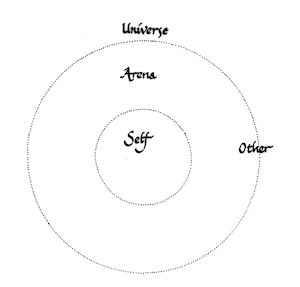
Origin was the first book written by a reputable 'man of science' that treated interaction between purposeful neighbours in a physical neighbourhood as a worthwhile research focus. The work was shaped by Darwin's own small-scale observations, his work as a field naturalist cataloguing and describing new species and Wallace's seminal contributions to biogeography. These ideas - agency, conflict, co-operation and space-time pattern on many scales - are so deeply embedded in the culture of 21st century science that each discipline has its own words to describe them. We will use the word plesionic, from the Greek plesion meaning 'neighbour', as an indicative term to describe this research focus.
Although Darwin's work was seminal in the sense that there are few plesionic texts in mainstream science before the 1860s, biologists were uncomfortable with the idea that non-human organisms were agents and kept Darwin's plesionic ideas beyond the pale of mainstream science. Darwin became a semi-mythic figure, often credited with ideas that owed more to Alfred Russel Wallace, Herbert Spencer, Karl Marx, mid-20th-century political theorists and, of course, the modern synthesis. The Cold War systems revolution and the many post-modern rebuttals of social engineering brought plesionic ideas into the ecological and anthropological mainstream, but traumatic memories of 'social Darwinism' were fresh and the plesionic dimension of Darwin's work was overlooked. Origin and Descent are no longer required reading and Darwin's direct influence on 21st century plesionic discourse has been limited.
It is now well understood that our species has evolved a range of empathic and linguistic faculties that fitted them for life in highly co-operative social units, which Darwin called 'tribes'. A Darwinian 'tribe' seems to be something more than an extended family unit; it is a primitive institution, common to all 'savages' that Darwin assumed would have a leader and some sort of mythic identity. Membership of a tribe would carry obligations and confer benefits.
Leaving aside the contextually loaded use of terms like 'savage', 'tribe' and 'leader', few anthropologists would now dispute Darwin's belief that early humans were pro-social and capable of altruism and that this pro-social tendency has a biological basis. The ability to acquire language and complex co-operative skills, for example, implies an innate expectation that the neighbourhoods we are born into will contain agents trying to communicate with us. Our species is so sensitive to agency that we recognise it even in situations where there are no agents. Synergetic multipliers have accentuated this predisposition to the point where most societies have protocols for communicating with these 'virtual agents'. Institutions like banks, polities and religious orders emerged as synergetic by-products of this cognitive predisposition.
A bank, a church or a government is not a convincing agent, nor is it capable of operating as a conventional plesionic system (see Figure 1), but the fact that we humans recognise, name and interact with institutions as if they were agents is ecologically significant (Winder N.P and Winder I.C. 2013, § 7). It would be perverse, in the plesionic sciences, to dismiss conflicts between institutions and individuals as 'delusions', when their ecological impacts are so profound. A person with a poor credit rating, for example, could argue with some justice that financial institutions were not agents and credit ratings were not 'real', but socially constructed. Nonetheless, the effect of that socially constructed consensus will constrain that person's freedom of action and, under certain circumstances, can reduce life-expectancy and destroy personal health.

Research on human/environment interaction is invariably reflexive - the research community and the objects of research both have the same ontological structure; each 'reflects' the patterns manifest in the other. A research team, for example, is a group of one or more biological organisms trying to understand, and possibly influence, a group of one or more organisms. Reflexive systems tend to be inter-connected in a complex, fractalic way. The team may be studying early hominins, for example, but trying to influence peers, mobilise funding from research councils, engage effectively with the press and participate in university politics. This fractal network of reflexive systems means that it is not always possible to be sure what their research is really about (Winder N.P. and Winder I.C. 2013, section 1: §9).